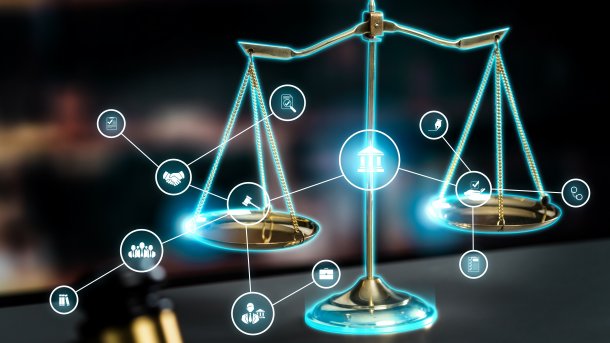Constitutional Court: High-level meeting on freedom of information is secret
FragDenStaat is taking Germany's highest court to court over unreleased documents on its talks with the ECHR about public access to legal files.

(Image: Shutterstock)
The Administrative Court in Karlsruhe has to deal with a sensitive issue regarding freedom of information in Germany. The transparency project FragDenStaat has filed a lawsuit against the Federal Constitutional Court (BVerfG) because the latter does not want to hand over documents relating to a high-level meeting with a delegation from the European Court of Human Rights (ECtHR) on June 19, 2023 in Karlsruhe. One of the main topics: access to information.
The civil society organization concerned wanted to know what the highest German court had discussed with its Strasbourg colleagues. FragDenStaat therefore submitted a request for access to files in accordance with the Federal Freedom of Information Act (IFG). However, the Federal Constitutional Court considers the requested documents such as minutes, handouts and other materials from the summit meeting to be particularly worthy of protection for various reasons.
The working session of the exchange on freedom of information took place under the chairmanship of the President of the Federal Constitutional Court, Stephan Harbarth (CDU), with introductions by Heinrich Amadeus Wolff from the Karlsruhe institution and Branko Lubarda from the ECtHR. This can be seen from the program and the agenda of the meeting, which were the only documents sent by the BVerfG in response to the IFG request. The manuscript of Wolff's presentation, which is at the center of the dispute, which has now dragged on for almost a year, was not included.
Inviolable core area of the judiciary too
FragDenStaat believes that transparency in this matter at the BVerfG is not just an optional extra, but a duty. What both sides discussed at the expert meeting is particularly important because the ECtHR is the higher court than the Federal Constitutional Court. Anyone who is unsuccessful with a constitutional complaint in Karlsruhe can go to Strasbourg with a human rights complaint. The ECtHR monitors compliance with the European Convention on Human Rights in 47 states. This also includes the right to freedom of information. In its case law to date, the ECtHR has been comparatively open to this.
Videos by heise
The Constitutional Court opposes this about its own case law: The Federal Government is entitled to an inviolable core area for its executive activities, which includes an area of initiative, consultation and action that cannot be investigated in principle. This protection even sets limits to the parliamentary right to information and must therefore be observed all the more in the case of IFG requests, as this is "merely a simple legal measure to promote principles enshrined in the constitution". Such principles must also be applied to the administrative activities of the Federal Constitutional Court.
The documents produced in the course of the expert discussions enjoy "special confidentiality", according to Karlsruhe. An additional reason for refusal under the IFG exists if international negotiations could be impaired. Furthermore, a lecture manuscript in particular clearly reflects the opinion of the author. On the other hand, the transcripts were of a provisional and non-binding nature and only served as preparatory support for the interpreters.
Freedom of Information Officer could do nothing
According to the BVerfG, the talks served the purpose of the necessary exchange of expertise within the European association of constitutional courts on the guarantee of the protection of fundamental rights. The deliberately chosen non-public setting made the necessary open discussion atmosphere possible in the first place, and should not be undermined by the subsequent release of documents. The latter was also ruled out due to the author's right of first publication.
FragdenStaat first called on the Federal Commissioner for Data Protection and Freedom of Information (BfDI), Ulrich Kelber, to act as a mediator. He considered the objections to the negative decision to be "understandable". His team pointed out that the requested information was official information within the meaning of the IFG and that there was no need to protect special public interests. Despite several interventions by the BfDI, the Constitutional Court maintained its position.
In the lawsuit, FragDenStaat now argues that no specific areas of activity are mentioned for the jurisdiction to which the IFG should not extend. This also applies to the maintenance of international relations and professional discourse within the Constitutional Court network. Expert discussions are to be qualified as material administrative activities. Discursive verbal contributions by the discussion participants do not constitute judicial activity. They serve to gain general knowledge in a mutual exchange of opinions based on various explanations by the participants on the abstract interpretation of the law and the reception of case law.
BVerfG: Press information right does not apply either
The "flight into orality" feared by the BVerfG for the future would, according to the plaintiffs, testify to a less self-confident judiciary and would be difficult to reconcile with the image of an independent, impartial judge. With the transmission of the manuscripts to the interpreters and their publication to the participants, the authors' opinion is sufficiently well established. There were just as few grounds for exclusion to protect confidentiality as there were because of copyright law. The rights of use are likely to have been transferred to the employer.
In response to a request from heise online for comment and an assessment of whether the case could ultimately end up as a complaint before the Federal Constitutional Court and how it would then be dealt with there, a spokesperson stated that no comment would be made on the ongoing proceedings, "especially as the information requested is not covered by the right to information under press law".
(nie)